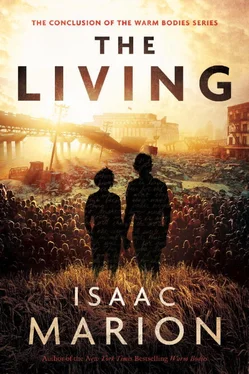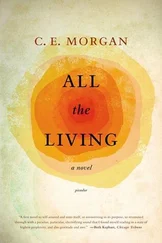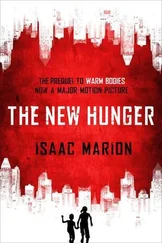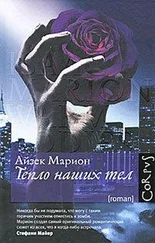Айзек Марион - The Living
Здесь есть возможность читать онлайн «Айзек Марион - The Living» весь текст электронной книги совершенно бесплатно (целиком полную версию без сокращений). В некоторых случаях можно слушать аудио, скачать через торрент в формате fb2 и присутствует краткое содержание. Город: New York, Год выпуска: 2018, ISBN: 2018, Издательство: Zola Books, Жанр: Ужасы и Мистика, ya, на английском языке. Описание произведения, (предисловие) а так же отзывы посетителей доступны на портале библиотеки ЛибКат.
- Название:The Living
- Автор:
- Издательство:Zola Books
- Жанр:
- Год:2018
- Город:New York
- ISBN:978-1-939126-38-2
- Рейтинг книги:4 / 5. Голосов: 1
-
Избранное:Добавить в избранное
- Отзывы:
-
Ваша оценка:
- 80
- 1
- 2
- 3
- 4
- 5
The Living: краткое содержание, описание и аннотация
Предлагаем к чтению аннотацию, описание, краткое содержание или предисловие (зависит от того, что написал сам автор книги «The Living»). Если вы не нашли необходимую информацию о книге — напишите в комментариях, мы постараемся отыскать её.
A WOMAN’S FIGHT FOR A WORLD WORTH LIVING IN
A HOPE THAT REFUSES TO DIE
The Living — читать онлайн бесплатно полную книгу (весь текст) целиком
Ниже представлен текст книги, разбитый по страницам. Система сохранения места последней прочитанной страницы, позволяет с удобством читать онлайн бесплатно книгу «The Living», без необходимости каждый раз заново искать на чём Вы остановились. Поставьте закладку, и сможете в любой момент перейти на страницу, на которой закончили чтение.
Интервал:
Закладка:
Will you guide me?
We don’t answer him. But the answer has always been yes. We guide him in faint breaths, distant echoes, the soft rustling of pages. We are open to him always and he reads us always, wheth-er he knows it or not.
We guide him through the forest. We alert him to monsters and introduce him to friends. We lead him across the country, through pain and terror to the heart of what he’s searching for, but that heart is a four-dimensional target. Its center drifts, its lines wander, and it is not always where it seems to be.
So when he arrives at his destination, he appears to have gone astray. Because here on the surface of time, floating atop the present, he is a prisoner on a bus on his way to be enslaved.
What will happen to us? he asks us as the bus hurtles through miles of wasteland. What should I do?
We don’t answer.
Why don’t you ever answer?
The boy sits on the back bench, sandwiched between his friends, Joan and Alex. Their revival has receded like he knew it would, and they are like him again, their skin cool but not cold, pale but not gray, their scent bland but with a faint effervescence of life. They are in flux. Mind and body and whatever else there is, weighing the world around them and debating what to be.
For now they are only prisoners, wrists cuffed in their laps. Two men with shotguns watch them like they’ve committed some terrible crime.
They have eaten a few people. Kids will be kids. But what about Sprout? Surely she’s done nothing to deserve this. She sits in the front with a handful of other Living children, and while most of them blubber and scream, Sprout is quiet. Not dazed and disconnected like her Dead peers, but calm. One eye is hidden beneath a sky blue eyepatch with a daisy painted on it, but she gazes out the window with the other eye, smiling faintly like she’s seeing visions in the passing scenery, the rising sun and the blurring trees.
Why did they take her? the boy asks us. Will they put her in that school with the noise and the poisons? What part of her could they possibly want to change?
We don’t answer.
The boy glares hard into the driver’s rear-view mirror. The driver slaps the side of his head as if to kill a mosquito and then looks at his hand, puzzled. He glances into the mirror and sees the boy’s yellow eyes boring into him.
“The fuck are you looking at?” he shouts over his shoulder.
The boy is looking at the cells of the driver’s scalp and through them to his skull and trying to find his way through that maze of osseous bubbles to the gray meat inside. When he sees the man’s eyes it becomes easy; he dives through the window of a pupil and follows a flock of photons along the optic nerve to the frontal lobe, and behind that is a small room with a small bookshelf with a few small books, mostly technical manuals, a few self-help guides, one or two thrillers, and a stack of pornography. Nothing the boy can use to reach him.
“Will somebody put a bag over that kid’s head?” the driver mutters to the guards. “Little freak’s creeping me out.”
“I think he’s in love,” one of the guards chuckles.
“I’m serious, asshole. I can’t drive with those fuckin’ wolf eyes in the mirror. Go knock him out.”
“You can’t knock out a zombie. They’re already out.”
“Then cut his damn eyes out, I don’t care. Just get ’em off me.”
Still chuckling, the guard saunters back toward the boy.
The boy reaches out to us, into us. He searches our shelves, looking for guidance, but he can’t find what he needs.
Help me, he begs. Answer me.
“You really want me to cut his eyes out?” the guard says, pulling a black tactical knife off his belt. “Doesn’t Orientation need intact specimens?”
“The ones with gilding are worthless. Almost as hard to Orient as Living folks and half as useful. He might have a better chance getting a job without the eyes.”
The guard shrugs. “Well, okay.” He flicks open the knife.
Something moves inside us. Certain regions of our vastness shudder in patterns, like someone trying to speak. Not an answer, exactly, but an impulse, a simple message encoded into bursts of will. It is addressed to the boy but loud enough for the others to hear. Roughly translated:
Fight.
In perfect unison, Joan and Alex grab the guard’s arm with all four hands and shove as hard as they can. His knife is suddenly not in his hand anymore; it’s in his stomach. He looks shocked and confused, like he’s been stabbed by something invisible.
All the children in the bus have risen to their feet like a classroom pledging allegiance. The other guard peers over their heads, trying to see what’s happening in the back. “Hey. You okay back there?”
The boy scurries up the aisle, crouched low, his bare feet silent on the floor, and he bites. His teeth sink through the guard’s pants and into the knotty calf meat. He feels the plague coursing through his cuspids, hardening them and imbuing them with venom, but it no longer feels like his own. It feels like a parasite living inside him, and though he can’t quite be rid of it, he can sometimes trick it into helping him.
The serenity has vanished from Sprout’s face. She spares only a second to watch the guard writhe, another second to give the boy a grim smile, then she steps into the driver’s area.
“Hi,” she says to the stunned driver, and pulls the wheel hard to the right.
What has come over us? We do not involve ourselves in the affairs of the living. We are the sum of what has been; we are the music, not the instrument. And yet there is a churning in us. A pressure that demands release. We feel parts of us pushing up from our depths, reaching out to touch, to help—to speak.
This has happened before. History is full of our reckless intrusions, often known as miracles. But it has been a very long time since we have boiled up like this.
Tires scream. The bus tips. And as the boy’s world shatters in a spray of glass, he sends us a message of his own. A simple reply, heavy with portent, like a volcano’s first hiss of steam:
We’ll fight.
ONE
the ladder
I would grieve at all that may befall you still
If I did not know you must return
And bury your own loss and build
Your world anew with your own hands.

I
HER BREATHS ARE SLOWING. Through the roar of the road, I hear their faint whistle. I feel each expansion of her body against my arm, the pressure pushing me deeper into the RV’s bristly cushions, so much like the couch in our house in a life that now feels like a dream. Her head grows heavier as she relaxes onto my shoulder, as the symbolic gesture becomes actual rest, and I savor this moment of peace, knowing we might not have many left.
I stretch it into months. Years. I live with her inside it.
Then something crunches under the tires and Julie jolts upright. Our bubble floods with conflict and purpose and the unknown horrors ahead. I stifle a groan.
“What was that?” Julie calls toward the front of the RV, rubbing her eyes.
“Roadkill,” Nora calls back.
“Sorry,” Tomsen adds. “Too big to avoid. Elk or deer or other ungulate.”
Julie leans back into the couch, but not onto me. She is wide awake now. I guess I’ll wake up too.
Читать дальшеИнтервал:
Закладка:
Похожие книги на «The Living»
Представляем Вашему вниманию похожие книги на «The Living» списком для выбора. Мы отобрали схожую по названию и смыслу литературу в надежде предоставить читателям больше вариантов отыскать новые, интересные, ещё непрочитанные произведения.
Обсуждение, отзывы о книге «The Living» и просто собственные мнения читателей. Оставьте ваши комментарии, напишите, что Вы думаете о произведении, его смысле или главных героях. Укажите что конкретно понравилось, а что нет, и почему Вы так считаете.










